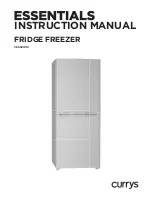
13
Operation
Switching On Your Unit
1. Connect the mains cable to the mains socket. The
internal temperature of your unit is controlled by
a thermostat. There are seven settings, of which
position 7 is the coldest and position 0 turns the
unit off.
2. Adjust the thermostat control dial to the desired
position, bear in mind that the higher the number,
the lower the temperature. Position 3 is the
recommended setting when operating at normal
room temperature (between 16°C and 32°C).
3. The unit may not operate at the correct
temperature if it is in a particularly hot or a
particularly cold room, or if you open the doors
often.
4. To ensure that the unit is cool enough to sufficiently
chill your food, wait 24 hours before filling it with
food.
5. If you are concerned that your unit is not being kept
cold enough and wish to check the temperature,
you will need a special fridge/freezer thermometer.
These are available from most supermarkets and
hardware shops. Place the thermometer in either
the fridge or freezer compartment and leave
overnight. The correct temperature for the fridge
compartment should be at the recommended 5°C
or lower. The correct temperature for the freezer
compartment should be -18°C or lower.
Adjusting the Temperature
The internal temperature of the unit is controlled by a thermostat. The recommended position
is between 1 to 4 for colder working environments (i.e. during winter) and between 5 to 6 for
hotter environments. Please adjust according to the environment.
Noises Inside the Unit!
You may notice that your unit makes some unusual noises. Most of these are perfectly normal,
but you should be aware of them!
These noises are caused by the circulation of the refrigerant liquid in the cooling system. It has
become more pronounced since the introduction of CFC free gases. This is not a fault and will
not affect the performance of your unit. This is the compressor motor working, as it pumps the
refrigerant around the system.






































